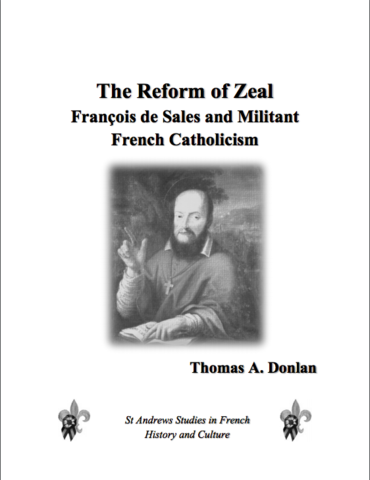The cover page of Dr. Donlan’s book The Reform of Zeal: Francois de Sales and Militant French Catholicism.
By Ryan Loo ’21
THE ROUNDUP
Dr. Tom Donlan, a Brophy religion teacher, has published a scholarly book, chronicling and “exploring the origins, nature, and impact of François de Sales’s vision of Catholic douceur (gentleness) in the era of the French Wars of Religion.”
Titled The Reform of Zeal: Francois de Sales and Militant French Catholicism, Dr. Donlan has compiled years of personal research on the French priest, Francis de Sales.
Dr. Donlan‘s interest in Francis de Sales stemmed from his time in graduate school.
“When I was in graduate school, I learned a lot about the Catholic Church in France and in the 16th and 17th centuries,” said Dr. Donlan.
Intrigued by the time period, Dr. Donlan decided to delve deeper into this era.
“Fear, aggression and violence were fairly common in this period,” he further noted, explaining, “it was the period of the French Wars of Religion, so, it was a time period in which, not all Catholics, but many Catholics so feared Protestants that they mobilized to wage war on [them].”
This violence amongst Catholics was largely unorthodox with Catholic teachings, which fascinated Dr. Donlan.
“So, I was interested in seeing if anybody in this time period–if there was a Catholic leader–that looked at the violence and critiqued it,” continued Dr. Donlan.
This prompted Dr. Donlan to begin researching it, leading to his eventual discovery of Francis de Sales.
“It was a 10-year process of studying him and Catholicism in that time period. At the beginning of those 10 years, I didn’t know much about him at all.”
However, as time passed, Francis de Sales’ teachings enthralled Dr. Donlan and he even lived in Paris for a time to do more research on him for his Ph.D.
In this time of turmoil and unrest, Francis de Sales actively worked to promote gentleness.
“He invited Catholics to a practice of gentleness: a gentleness in how they treated Protestants, a gentleness in how they treat themselves,” Dr. Donlan explained. “Also, he says that the relationship with God should be one of gentleness and trust.”
Dr. Donlan delved into the meaning of gentleness and how it pertained to Francis de Sales.
“I found that he frequently used the word gentleness, especially in the latter half of his life, as a way of framing and explaining Catholicism.”
Francis de Sales viewed God as a “friend, loving parent, and someone with whom you travel with on life’s journeys.”
However, de Sales’ views were not always this peaceful.
In his youth, he was attracted to this Catholic militancy, as he viewed it as courageous, brave, and truly Catholic.
Thus, he participated in this militant Catholicism, not harming Protestants, but “waging war on himself through extreme fasting and flagellation.”
With the help of his family and Jesuit teachers, he was guided towards a less aggressive practice of Catholicism, from where he ultimately came to develop a new vision of Catholicism.
Dr. Donlan clarified, “In response, he taught that such constant self-denunciation is unhelpful and unchristian. De Sales also taught that God is more interested in a relationship with us than with our attainment of perfection. “
Though these teachings were established in the 16th and 17th centuries, Dr. Donlan believes they are still applicable today and can even be helpful to Brophy students.
“Some Brophy Broncos are very hard on themselves, condemning themselves for not attaining excellence, whether moral, academic, or athletic,” Dr. Donlan said.
“Francis would urge these students to temper their self-criticism, let go of their fears, and have faith in Jesus.”
However, even more important, Dr. Donlan stresses that “Francis would insist that loving relationships with oneself, others, and God are more important than personal achievements.”



















